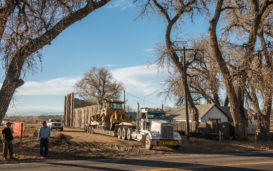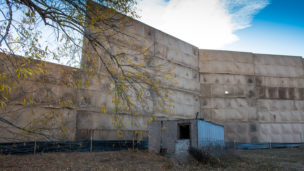A group of homeowners in Greeley filed a lawsuit this morning in Denver District Court against the Colorado Oil and Gas Conservation Commission (COGCC), alleging that the state agency ignored its own rules in approving a 24-well site in their neighborhood.
The lawsuit, filed by the University of Denver’s Environmental Law Clinic on behalf of “Neighbors Affected by Triple Creek,” claims the development “will negatively impact their health, safety, and welfare through the increased noise, pollution, and traffic associated with the project.” The homeowners say their suit represents an unprecedented challenge to the Commission’s application of new regulations. According to the court documents, “A ruling in this case will have a ripple effect across the state in assuring the Commission is accountable by requiring meaningful consideration of public health, safety, and welfare in its oil and gas permit decisions.”
Todd Hartman, spokesman for the Department of Natural Resources, which includes the COGCC, said “We don’t have any comment today.”
The suit comes just over a month after the COGCC, which is in charge of regulating oil and gas companies in Colorado, approved the Triple Creek project. It was the first Front Range test of new neighborhood drilling rules put forth by Gov. John Hickenlooper’s 2014 oil and gas task force and adopted by the COGCC in January 2016. The rules were intended to reduce the impacts of oil and gas drilling in residential neighborhoods, where there has been an uptick in drilling activity – and community opposition.
Related: FRACTURED, Part V: Trouble in Triple Creek
The most substantive part of the new regulations included provisions to better protect people from the most severe impacts of drilling in their neighborhoods.
The rules defined “Large Urban Mitigation Areas,” or UMAs, as places where 11 or more homes are within 1000 feet of a well site with eight or more wells. The rules require that any operator looking to drill in such an area 1) place the wells “as far as possible” from dwellings, and 2) utilize “best available technology” to conduct their operations.
Today’s lawsuit alleges that Extraction Oil and Gas, the operator of the Triple Creek site, failed on both counts. “Despite the regulations, the Commission permitted the Triple Creek location without requiring an alternative location analysis and without requiring the use of all best available technologies, such as oil pipelines, which would greatly reduce the impacts to nearby homeowners.” The suit alleges that the COGCC’s failure to adequately consider its new regulations was “arbitrary, capricious, not in accordance with law, an abuse of discretion, and in excess of the Commission’s statutory authority and its jurisdiction.”
The suit also claims that in approving the project, the COGCC failed to require that Extraction Oil and Gas use existing access roads where possible. Instead, the Commission approved construction of a new road that runs 50 feet from the bedroom of Dawn Stein, a 60-year-old Triple Creek resident who has lived in her home for more than 30 years.
Part of Triple Creek Residents’ anger stems from a feeling of having been misled by Extraction during the approval process. Prior to its filings with the COGCC, Extraction held a neighborhood meeting, during which its representatives told neighbors the company’s plan was to go “tankless.” That approach calls for pipelines to transport oil and gas rather than storing it in large tanks on site before trucking it to processing facilities. Pipelines vastly reduce truck traffic, one of the highest impacts of residential oil and gas development. But Extraction left out any mention of the pipelines from its formal application with the city of Greeley and the COGCC, opting instead to install 24 tanks at the location and use tanker trucks to haul the oil and produced water from the site.
In responding to public comments complaining about Extraction’s apparent backtracking on its commitment, the COGCC stated that there was no “statutory or regulatory requirement” for Extraction Oil and Gas to use pipelines to transport fluids from an oil and gas facility.
In the lawsuit, however, plaintiffs say the COGCC’s new requirement that operators use “best available technologies” mandates the use of pipelines from the start. Extraction, like some other Colorado operators, has proven itself capable of going tankless, but pipelines are more expensive than tanks. An Extraction representative said they hope to eventually transition to pipelines instead of storage tanks, but couldn’t say when.
Extraction estimates that there will be more than 25,000 round trips to the facility over the period of site preparation, drilling, and hydraulic fracturing of the 22 wells, which will take three years to drill and complete. Other best management practices identified in the lawsuit – but not specifically included in Extraction’s public plans to date – include the use of special filters on all diesel trucks used by the company and its contractors, and limiting some of the industrial activity to the daylight hours between 7 a.m. and 7 p.m.

Extraction graded a road 30 feet from Triple Creek resident Dawn Stein’s bedroom window. (Ted Wood/The Story Group)
Triple Creek residents petitioned in person before the entire COGCC at a recent meeting in Sterling, asking for a new review of their case. Senior Assistant Attorney General Jake Matter, who represents the COGCC, wrote to the Triple Creek residents on Oct. 27, 2016 that they lacked the legal standing to compel the hearing they requested.
Residents hope the District Court will be another story. Lead attorney Kevin Lynch, an associate professor at the University of Denver’s Sturm College of Law, took on the case pro bono as part of DU’s Environmental Law Clinic’s program. The clinic gives second- and third-year law students opportunities to start working on real cases while in law school. In an interview with The Colorado Independent, Lynch said that the Triple Creek case provides an opportunity for “an objective third party to take a fresh look” at whether the COGCC is fulfilling its statutory mandate to promote oil and gas development in ways that are “consistent with the public health, safety, and welfare” of Colorado citizens. “The fact that the Commission has approved every single permit that’s come before them,” said Lynch, suggests that the Commission has been “striking a really absurd balance.”
Colorado has been reckoning with tensions among communities and oil and gas operators for years, since a natural gas boom prompted drillers to move closer and closer to neighborhoods to extract the valuable fossil fuels beneath. In the last five years, four Colorado cities and two counties passed temporary moratoria on fracking in their jurisdictions. The state fought back against the bans, arguing that cities, towns and counties do not have the power to regulate oil and gas, except to approve certain aspects of applications. Upon having their fracking bans overturned, both Longmont and Fort Collins took their cases to the state Supreme Court. The Court sided against them in May, ruling that state regulatory power trumps local authority. Yesterday, Boulder County temporarily extended its moratorium, which was scheduled to expire today, until the end of January 2017, in order to give its staff additional time to prepare new county regulations.
“We must ensure that we have the absolute best protections in place before we can move forward,” Boulder County Commissioner Chair Elise Jones said in announcing the extension.
In 2014, as these tensions intensified, Gov. John Hickenlooper assembled an oil and gas task force in an effort to reach a “middle ground” between increasingly polarized sides and work towards palatable solutions. After a long and controversial session that lasted several months, the task force agreed to give the COGCC more enforcement resources, among other changes.
In Greeley, Triple Creek residents have already watched with dismay as Extraction Oil and Gas quickly constructed 32 feet-high walls adjacent to Dawn Stein’s property, beginning on Nov. 4. Stein said she isn’t sure if the sound barrier will help with the rumble of the trucks, which are scheduled to operate 24 hours a day, seven days a week during the drilling period, but said it certainly has eliminated her view of the mountains to the west. Stein said she asked a young man from Extraction how long the walls would be there. His response, according to Stein, was, “Good question.”
“It’s almost like I’m in a box right now,” she said Wednesday, watching in dismay as the truck traffic rolled by her yard and the walls grew taller and longer. The thin walls, made of a thick, vinyl-like material, were built to shield Stein and other neighbors from the annoyances of industrial activity, including sound and light for nighttime work. They won’t help with her biggest concern, however: “The diesel fumes from of all those trucks that are idling outside my bedroom window.”
Indeed, even in the initial phases of the project, it was clear on Wednesday that trucks waiting to turn onto the rural two-lane highway in front of Stein’s house will have to idle next to her house, sometimes for minutes at a time, before traffic thins enough to allow the trucks to pull out. On Thursday, a tanker truck carrying 194 barrels of crude oil from a similar drill site in Adams County overturned on Riverdale Road near Brighton. A hazmat crew from the Brighton Fire Department worked to contain the oil, of which more than 100 gallons spilled. That site, operated by Ward Petroleum, is smaller than the development planned for Triple Creek.
Lowell Lewis, one of the Triple Creek residents, has criticized the COGCC for appearing to side with the industry at every turn, ignoring not only the new regulations but also neighbors’ concerns. Lewis said this bias was apparent from his first interactions with the COGCC. At that point, Lewis said, COGCC officials attempted to literally cut corners on Extraction’s application by redefining the borders of the site, in order to ensure that the Triple Creek project was not even considered a Large Urban Mitigation Area under the new rules. In one email to COGCC administrators, Lewis wrote, “The more I hear about how COGCC goes to all lengths to help an operator (to the detriment of the public) to make minor project changes to avoid the rules that you should be administering uniformly, the more I think that you should place the following Mission Statement beneath your letterhead: “Making New O&G Projects Slightly Less Unpalatable for Neighborhoods Across Colorado.”
Now, Lewis says, the lawsuit is the group’s only recourse.
For her part, Stein tried to appeal to the entire COGCC during its last meeting in Sterling to reconsider the approval of Extraction’s proposal as it was presented. After taking it under advisement during executive session, the Commissioners decided they would not change their decision, leaving the Triple Creek residents with this legal remedy to pursue. “I’m hoping and praying that it makes the the COGCC enforce the rules they have in place for these large drill sites,” Stein said. “Since it’s the first one we have in Colorado of this size and proportion, they need to enforce the rules from the very first one, or it’s all for naught.”
-Daniel Glick, Kelsey Ray and Ted Wood, The Colorado Independent

